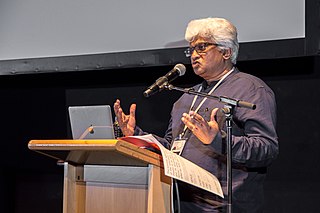
Kathakali is a major form of classical Indian dance. It is a "story play" genre of art, but one distinguished by the elaborately colourful make-up and costumes of the traditional male actor-dancers. It is native to the Malayalam-speaking southwestern region of Kerala and is almost entirely practiced and appreciated by Malayali people.

Catholic High School (CHS) is a government-aided autonomous Catholic boys' school in Bishan, Singapore, founded in 1935 by a French missionary, Reverend Father Edward Becheras. One of the Special Assistance Plan schools in Singapore, it has a primary school section offering a six-year primary education, as well as a secondary school section offering a four-year secondary education. Since 2013, it has partnered with Eunoia Junior College for a six-year Integrated Programme, which allows its secondary school students to proceed to Eunoia for Years 5 and 6 and take the Singapore-Cambridge GCE Advanced Level examinations at the end of Year 6.

The National Institute of Dramatic Art (NIDA) is an Australian educational institution for the performing arts based in Sydney, New South Wales. Founded in 1958, many of Australia's leading actors and directors trained at NIDA, including Cate Blanchett, Sarah Snook, Mel Gibson, Judy Davis and Baz Luhrmann.

Ivan Heng is a Singaporean actor and theatre director of Peranakan descent. He is the founding artistic director of W!LD RICE, a theatre company in Singapore, and an outspoken advocate for respect for diversity and freedom of expression.
Mark Chan is a Singaporean composer, recording artist, singer, instrumentalist, poet, and painter. He studied fine arts at the Edinburgh College of Art and is recognised as a renowned Singaporean composer.
Tan Kheng Hua is a Singaporean actress. She is best known for her supporting role in the 2018 film Crazy Rich Asians and for the martial arts television series Kung Fu in 2021.

Yeo Yann Yann is a Malaysian actress. She has worked in theatre, television, and film. Her credits include Singapore Dreaming, Thunderstorm, 881, Ilo Ilo and Wet Season.

The Substation is Singapore's first independent contemporary arts centre. It was founded in 1990 by Kuo Pao Kun. The Substation is centrally located in the city's civic district and was the first building under the National Arts Council's "Arts Housing Scheme". It officially opened on 16 September 1990. The Substation is a non-profit organisation and registered Institution of Public Character in Singapore, which relies on financial and in-kind support from the general public, commercial organisations and government ministries to cover the costs of operating and developing arts & educational programmes.
Intercultural theater, also known as cross-culturaltheatre, may transcend time, while mixing and matching cultures or subcultures. Mixing and matching is the unavoidable process in the making of inner connections and the presentations of interculturalities. The majority of the works in intercultural theatre deal basically with thinking and doing around the themes, stories, pre-performative or performative concepts of Asian classical theatre or traditional performing arts forms and practices, mixing and matching the concepts or the ideas of the foreign. After the well-known success of Peter Brook's production of the Mahabharata, the trend has been evolving tremendously around the globe and many the cultural institutions of many governments have become directly interested in pushing the boundaries of intercultural senses and sensitivities by financially investing on new theatrical productions, university research, conferences and fellowships

Kuo Pao Kun was a playwright, theatre director, and arts activist in Singapore who wrote and directed both Mandarin and English plays. He founded three arts and drama centres in Singapore, conducted and organised a number of drama seminars and workshops, and mentored Singaporean and foreign directors and artists.
Keagan Kang is an Australian actor living and working in Singapore.

Thirunalan Sasitharan is a Singaporean theatre educator and the co-founder and director of Intercultural Theatre Institute (ITI), formerly known as the Theatre Training & Research Programme (TTRP).
Marc Goldberg is a French theatre director, playwright, actor, and translator.
Terence Crawford is an Australian actor, author, theatre director, academic, and songwriter.

Sreejith Ramanan is an Indian contemporary theatre director, actor, theatre maker, researcher and theatre-trainer who has been described by the media as "a versatile Indian contemporary theatre actor". Over the course of his wide-ranging career, he has also worked as a choreographer, stage designer, theatre technical director, Sound and Lighting designer. He is best known for his collaborations with cross-cultural theatrical adventures with notable numerous artists, theatre directors, including Hiroshi Koike, Dr Phillip B Zarrilli, Uichiro Fueda, Ram Gopal Bajaj, S.Ramanujam, Abhilash Pillai, Leela Alaniz, Kok Heng Leun and Terence Crawford
Goh Lay Kuan is an Indonesian-born Singaporean dancer, choreographer, educator, and pioneer of dance in Singapore. Together with her husband, Kuo Pao Kun, she co-founded the Singapore Performing Arts School, a seminal institution in Singaporean modern theater and dance.
Anuradha Kapur is an Indian theatre director and professor of drama. She taught at the National School of Drama (NSD) for over three decades and was the Director of National School of Drama for six years (2007–2013). For her work as a theatre director, the Sangeet Natak Akademi Award was conferred on her in 2004. In 2016, she was awarded the J. Vasanthan Lifetime Achievement Award for excellence in theatre. Her work as a director is noted for its open and interactive nature.
Lim Tzay Chuen is a Singaporean contemporary artist known for his conceptual works that involve designing or constructing subtle interventions within systems, leading viewers to re-evaluate their perceptions and assumptions of social, economic, cultural and political processes.
Goh Boon Teck is a Singaporean director, playwright and production designer.











